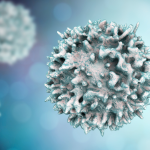Disease-modifying therapies (DMTs) are used in multiple sclerosis (MS) to suppress immune responses that inappropriately attack the brain and spinal cord. But do these MS treatments also diminish a person’s capacity to fight infection? Can people with MS on DMTs still make antibodies? These are fundamental questions to determine whether people with MS can develop effective immunity to COVID-19, either through infection or vaccination, while maintaining their MS treatment.
Research addressing these questions and other impacts of COVID-19 on people with MS is ongoing. Measuring the effects of DMTs on vaccine effectiveness isn’t new because vaccinations are a regular part of routine healthcare for people with MS.
Before we deep dive into the immune system, medications, vaccines, and viruses, we need to take a step back and look at the human body.
How the body stops pathogens
The body has many lines of defence against a pathogen (a bacterium, virus, or other disease-causing microorganisms). First, we have skin which forms a barrier. On our skin are excretions that contain chemicals that kill bugs (for example, human sweat contains an antibiotic peptide called dermcidin). The next line of defence is a non-specific or general defence system inside the body known as the innate immune system. The body’s innate immune system includes the body’s ability to generate inflammation or red, hot, swollen areas if a part of the body gets infected or damaged (imagine a sprained ankle or an infected cut). The last line of defence is the adaptive immune system; this is very specific, very powerful and creates long-lasting specific protection against particular pathogens.
The adaptive immune system
The adaptive immune system is essential when it comes to DMTs and for immunity against SARS-CoV-2, the virus that causes COVID-19. The adaptive immune system is a fantastic and intricate network, made up of different organs in the human body and various types of immune cells.
Adaptive immunity, as the name suggests, develops as the immune system learns to effectively fight off specific germs, such as the virus that causes COVID-19. It is based on a class of cell called a lymphocyte, a type of white blood cell that can be further separated into B cells and T cells. These subtypes of lymphocytes can be further classified into many different cell types with different functions. They work together to produce a long-lasting immunity against a wide range of foreign bodies and germs.
The immune system and MS
The innate and adaptive immune systems work together to rid us of infections. Sometimes, however, the immune response goes awry, as in the case of autoimmune conditions such as MS. In these disorders, the immune system mistakenly attacks the body as though it is foreign. To stop this, we have developed several medications or DMTs to suppress the immune system from attacking the myelin layer, the fatty protein-rich coating of nerve fibres that enables effective transmission of nerve impulses.
In Australia, we are lucky to have access to 15 different medications that all in some way target the immune system. These 15 medications have been proven to be very effective in treating Relapsing-Remitting MS. Unfortunately, they don’t appear to have a marked effect on people with progressive forms of MS, likely due to different underlying disease mechanisms between relapsing forms and progressive forms of the disease.
Activating the immune system
The immune system constantly surveys the body. Specialised cells scan the tissue and scavenge debris, chopping it up and feeding the fragments to T cells. These T cells then decide whether it is harmless (part of the body) or harmful, i.e. a bug or virus. These cells can also directly detect if another cell is infected by a virus and kill it.
Once T cells recognize something foreign, they recruit B cells to create antibodies against the pathogen. These antibodies float around our body, stick to and “tag” any copy of that pathogen they encounter. Once tagged, a range of cells will come in and destroy that pathogen and signal to the B cells specifically targeting that bug to multiply. Once the threat has been eliminated, the immune system quietens down, but not before it makes “memory cells” that keep a lookout for that same bug. If memory cells see the same pathogen again, they are primed to execute an already optimized immune response, sometimes without the person even experiencing symptoms of the infection.
SAR-CoV-2 infection and COVID-19 vaccination
If we are unvaccinated and are infected by SARS-CoV2 for the first time, our immune system will take some time to respond because it has never seen this virus before. In addition, the virus has a few tricks up its sleeve to hide from the immune system. In some cases, the disease caused by the infection is so severe that the immune response cannot contain it in time. But given sufficient time, an adaptive immune response will be mounted to specifically destroy the virus. We will also develop immune memory, so that if we encounter SARS-CoV2 a second time, a primed and optimized immune response is at the ready, giving us a much better chance of containing the infection quickly.
This is the principle behind vaccination: to induce an antibody response and immune memory to components of the pathogen in advance, so that we can more effectively combat a natural infection when it occurs. You can read more about COVID-19 vaccinations in MS here. The immune memory induced by vaccination with virus components may not always be the same as that induced by a natural infection. When induced by a natural infection, the immune system “sees” all of the virus and has the context of other “danger signals” from the innate immune system when it is exposed to a live virus.
Inducing COVID-19 immunity on DMTs
DMTs are designed to dampen down immune responses in autoimmune diseases such as MS, to prevent the immune system from mistakenly attacking the body. They include therapies like ocrelizumab, which reduces the number of B cells; while others such as fingolimod trap the immune cells in certain parts of the body so they can’t enter the brain and cause damage. Others, including cladribine, generally reduce the overall number of lymphocytes in the body. Early MS medications such as interferons worked on interfering with the normal chemical signaling between immune cells. Each DMT significantly affects the adaptive immune system, so what happens when this DMT-altered adaptive immune system encounters the COVID-19 virus?
Interestingly, while scientists had never encountered COVID-19 before the current pandemic, they have for many years been looking at the effects of DMTs on the adaptive immune response and its ability to protect the body following vaccination. The evidence indicates that the different DMTs have different effects on vaccine response, and that medication timing has a significant impact, i.e. soon after taking some medicines, the immune system struggled to produce a response to vaccines, but even a couple of weeks post-treatment the adaptive immune response was better.
When scientists have looked at COVID-19 and the response of people with MS on DMTs, they have found different outcomes. Scientists in Sweden studied people who had therapies that targeted specific B cells, i.e. ocrelizumab and a similar medication rituximab. Their results (currently undergoing peer review) indicate that people on these treatments who have previously had COVID-19-like symptoms were capable of developing antibodies against SARS-CoV-2 despite their numbers of B-cells being reduced. In contrast, unpublished data emerging from Israel following widespread vaccinations suggests that people on B cell therapies have a reduced ability to produce antibodies against SARS-CoV-2. They found the same for people on fingolimod, but not for people on cladribine. Information about other MS DMTs has not been reported yet. These results are based on small numbers, and whether there is a difference in the antibody response to a natural infection and vaccination remains to be seen.
However, the results of the Israeli COVID-19 vaccination study align with previous studies showing a reduced ability to produce an immune response against various other vaccines (non-COVID-19 vaccines) following B cell therapy. Despite this, these investigators concluded it was still worthwhile for people on these treatments to receive vaccines as even though the response was lower, there was some protection expected.
A retrospective study also identified a small number of people who also received vaccinations during the clinical trials for cladribine, including vaccines for the flu and chickenpox (Varicella-zoster virus). The analysis showed protective influenza antibody levels at four weeks post-vaccination in people with MS taking cladribine. Additionally, both vaccines showed that protective antibody levels were maintained or increased regardless of the level of white blood cells in the blood. While this is a limited and early study presented at ACTRIMS (Americas Committee for the Treatment and Research in MS), it indicates that people taking cladribine can mount and maintain an effective vaccine response.
What does this mean for people with MS?
This research is ongoing, but work in other fields where B cells are reduced, such as cancer patients on B cell therapies, suggests in the absence of B cells, T cells might still be able to mount an effective response against pathogens. This is giving us fascinating insights into the amazing machine that is the human immune system. While there is more work to be done to understand the intricacies of vaccine response while taking B cell therapies, the take-home message is that vaccination is safe for people with MS on DMTs.
If you are taking a particular DMT, your specialist healthcare team might suggest delaying your vaccination for a short time after your MS treatment, not out of any risk, but to maximize your immune response against a vaccine. View our COVID-19 Hub here for more information about specific DMTs and vaccination for people living with MS. As always, if you have any questions about your health, MS treatment, or vaccination, please talk to your specialist healthcare team.




